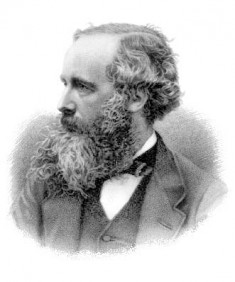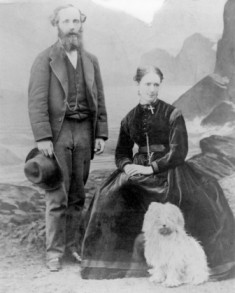| James Clerk Maxwell | |
|---|---|
 |
|
| Physicist | |
| Specialty | Physics & mathematics |
| Born | June 13, 1831 Edinburgh, Scotland |
| Died | Nov. 5, 1879 (at age 48) Cambridge, England |
| Nationality | Scottish |
James Clerk Maxwell was a very innovative and influential Scottish mathematical physicist. He is best known for the set of equations he formulated to clearly describe how optics, electricity, and magnetism are all manifestations of the electromagnetic field. His is considered the second greatest mind in this area of physics, second only to the legendary Sir Isaac Newton.
Early Years of Maxwell
James Clerk Maxwell was born in Edinburgh, Scotland, in 1831. He grew up in a fairly affluent household and was not one to want during his early years. The early education of Maxwell started out on very poor footing. Although he was a bright young man, the tutor hired to educate him was utterly terrible in the job.
The tutor was very harsh and unhelpful to Maxwell. In time, Maxwell’s father fired the tutor and sent the young man off to the Edinburgh Academy. The ten-year-old had a hard time at the academy because he grew up mostly isolated.
Maxwell showed amazing skill at geometry. However, he was enrolled in the wrong school at the wrong time. The school overlooked a lot of his abilities and never truly cultivated his talents. Maxwell won a few school awards, but they were nominal in nature. He was able to write a paper on the subject of mathematical curves entitled Oval Curves and it received acclaim.
Maxwell went on to enroll in the University of Edinburgh where he could truly begin work on mastering his studies.
Maxwell’s University Years
Maxwell’s formal education at the University of Edinburgh was really the first time he was able to cultivate his talents in the proper manner. While be found the classes at the university fairly easy to handle, he did not become lazy. Maxwell invested a tremendous amount of time in personal, private study increasing his already exceptional knowledge base.
At the university, he wrote two very influential papers. The first was On the Equilibrium of Elastic Solids and it would build on later works and achievements in his professional career. The second paper, Rolling Curves, was also highly regarded.
Maxwell would then attend the University of Cambridge and attained a degree in mathematics. In very short order, he was made a fellow.
The Works of Maxwell
 Maxwell was far from a mere academic when it came to the achievements he was known for. Among his most well-regarded works was the publication of a treatise entitled A Dynamical Theory of the Electromagnetic Field. Published in 1865, the work was a revolutionary one.
Maxwell was far from a mere academic when it came to the achievements he was known for. Among his most well-regarded works was the publication of a treatise entitled A Dynamical Theory of the Electromagnetic Field. Published in 1865, the work was a revolutionary one.
In its pages, a unique theory was presented and it stated electric and magnetic fields move through space as waves. Most importantly, they moved through space at the speed of light. Maxwell offered forth his opinion about light and it noted that light is related to the cause of phenomena that are electric and magnetic. These notions would be further built upon in time and the theory light and electrical phenomena share such traits set the stage for the eventual discovery of radio waves.
The Maxwell–Boltzmann distribution was another great innovation he was involved with. The distribution centered on the topic of the kinetic theory of gases. In particular, it was a system designed for employing a statistical means of actually describing the various aspects related to these gases.
Legacy and Death of James Maxwell
Maxwell may not be as well known to the general public as such iconic figures as Newton or Einstein, but his life’s work was enormously helpful to the advancement of physics in the 20th century as a significant number of theories built upon Maxwell’s discoveries in the 19th century. Among the areas where he greatly influenced development and innovation were special relativity and quantum mechanics.
Among his peers, it is safe to say that Maxwell did receive a great deal of recognition. Upon compiling a list of the top 100 physicists, Maxwell was ranked third on the list. This reflected just how important he was considered to be among modern physicists.
Among the saddest things about James Clerk Maxwell was his passing came at such an early age. He was only 48 years old when he died as he quickly succumbed to abdominal cancer, the same cancer that took his mother.